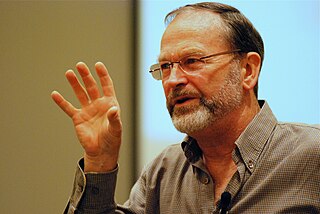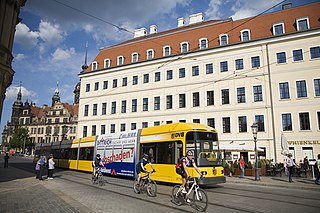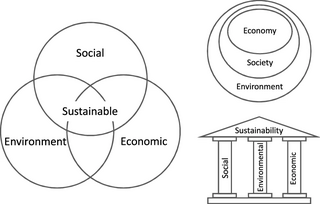Works
Green economy

Stanislav Edward Shmelev edited the widely used [2] 'Green Economy Reader'. This was responsible for bringing together works by leading ecological economists and sustainability experts. The contributors include Professors David Orr, Peter Söderbaum, [3] [ dead link ] Robert Ayres, Herman Daly, Stanislav Shmelev, Anthony Friend, Stefan Speck, Herbert Girardet, Stefan Giljum, [4] Terry Barker, Jeroen van den Bergh, David Elliott, Joan Martinez-Alier, Irina Shmeleva, Robert Costanza, Gar Alperovitz, Joshua Farley, Carol Franco, Tim Jackson, Ida Kubiszewski, Juliet Schor and Peter Victor. [5]
- Shmelev S. E. Speck S. U. (2018) Green Fiscal Reform in Sweden: Econometric Assessment of the Carbon and Energy Taxation Scheme, Renewable and Sustainable Energy Reviews, Volume 90, July 2018, pp. 969–981
Ecological economics: Sustainability in Practice

Stanislav Edward Shmelev authored the widely used [6] textbook 'Ecological economics: sustainability in practice ( ISBN 978-94-007-1971-2). The book officially launched in 2012.
Macro sustainability Assessment
Stanislav Edward Shmelev developed a novel method of sustainability assessment that uses the potential of multi-criteria decision aid tools (MCDA) and applies them to the dynamic sets of sustainability criteria. This research developed from a series of lectures he gave at European universities on sustainability in Russia, where social and environmental aspects of economic development have been neglected. This methodology is particularly important for defining sustainability, assessing the progress towards sustainability of a given society or system. Several applied cases have been published now:
- Shmelev S. (2017), ed. 'Green Economy Reader: Lectures in Ecological Economics and Sustainability', Springer, 463 pp. https://www.springer.com/gp/book/9783319389172
- Shmelev S. (2012) "Ecological Economics: Sustainability in Practice', Springer, 248 pp. https://www.springer.com/gp/book/9789400719712
- Shmelev, Stanislav E. (2011). "Dynamic sustainability assessment: The case of Russia in the period of transition (1985–2008)" (PDF). Ecological Economics. 70 (11): 2039–2049. doi:10.1016/j.ecolecon.2011.06.003. S2CID 154759626.
- Shmelev S. (2010) Multi-dimensional Analysis of Macro Sustainability of Russia, Politex, Vol. 4, pp. 115–133
- Shmelev S. and Rodrigues-Labajos B. (2009) Dynamic multidimensional assessment of stability at the macro level: The case of Austria, Ecological Economics, Vol. 68, Issue 10, pp. 2560–2573
Multidimensional assessment of biodiversity
In 2008-2009, Stanislav Shmelev produced a major report for IUCN where he presented a rationale for the Multidimensional Assessment of Ecosystems and Biodiversity. The report has been published in Shmelev (2012).
In 2009, the United Nations Environment Programme invited Shmelev to be a reviewer for The Economics of Ecosystems and Biodiversity (TEEB) Report [7] [ dead link ]
In 2018, Stanislav Shmelev published a photography album entitled 'Ecosystems', which hoped to show the futility of measuring ecological worth with monetary value.
In 2021, Stanislav Shmelev was selected as one of the world's 120 top contemporary artists and exhibited at the Arte Laguna Prize exhibition in Venice.[ citation needed ]
Sustainable energy
The innovative paper published in Renewable and Sustainable Energy Reviews adopts a multi-criteria perspective and extends the UK decarbonisation scenarios by dimensions that are often overlooked, namely, employment, land use, water use and diversity of the energy mix *Shmelev, Stanislav E.; Van Den Bergh, Jeroen C.J.M. (2016). "Optimal diversity of renewable energy alternatives under multiple criteria: An application to the UK". Renewable and Sustainable Energy Reviews. 60: 679–691. doi:10.1016/j.rser.2016.01.100.
In 2009, Shmelev was interviewed for the European Union Euronews Channel on the issues of renewable energy and sustainable development [8]
Sustainable waste management
- Shmelev, S.E.; Powell, J.R. (2006). "Ecological–economic modelling for strategic regional waste management systems". Ecological Economics. 59: 115–130. doi:10.1016/j.ecolecon.2005.09.030.
Sustainable cities
The issue of sustainable cities has been dealt with by Shmelev in the context of the interdisciplinary linkages in the development of large cities. He co-organized two international workshops on sustainable cities at the University of Oxford and Saint Petersburg State University.[ citation needed ]
The first workshop resulted in a book:
- Shmeleva I. A. and Shmelev S. E. (Eds) (2007) Sustainable Urban Development: Interdisciplinary Approach, St Petersburg State University, 265 pp.
The second workshop produced a special issue of the International Journal of Sustainable Development entirely devoted to sustainable cities: [9] [ dead link ] [10]
The issues of multidimensional benchmarking for megacities have been analysed in detail in the recent book, Green Economy Reader: Lectures in Ecological Economics and Sustainability ISBN 978-3-319-38919-6 [ citation needed ]
New peer-reviewed publications exploring the subject of smart and sustainable cities include:
- Shmelev. S.E., Shmeleva I.A. (2019) Multidimensional sustainability benchmarking for smart megacities, Cities, 2019, Vol. 92, pp. 134–163
- Shmelev S. E., Shmeleva I.A. (2018) Global urban sustainability assessment: A multidimensional approach, Sustainable Development, 2018; Volume 26, Issue 6, pp. 904–920;
and a new volume:

- Shmelev S.E. (ed) (2019) Sustainable Cities Reimagined: Multidimensional Assessment and Smart Solutions, Routledge, 312pp. https://www.routledge.com/Sustainable-Cities-Reimagined-Multidimensional-Indicators-and-Smart-Solutions/Shmelev/p/book/9780367254209
Environmentally-Extended Input-Output Analysis

A detailed environmentally-extended input-output analysis of the UK economy is presented in Sustainability Analysis: An Interdisciplinary Approach ISBN 978-0-230-36243-7 [ citation needed ]









